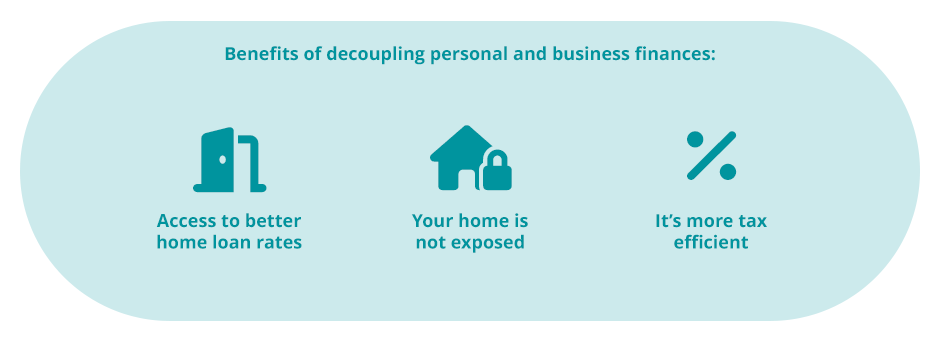Is your business and personal finance wrapped up together? If so, now might be the time to consider ‘decoupling’.
Access to funding is critical for many small businesses. And, the reality is that traditional lenders don’t typically lend to businesses who don’t have an extensive trading history. As a consequence, many businesses have resorted to using their personal mortgage, a personal loan or credit card to fund their business, with the belief that doing so is a viable and cost effective alternative.
“Using personal credit sources to facilitate business funding has been born out of necessity for many small businesses, as banks – which historically have been the only source of finance – usually require the applicant’s house as security for the business loan,” says Nathan Watt, managing director of Watson & Watt, a Queensland-based accounting and tax advisory consultancy that specialises in working with small businesses.
Fast forward to the current landscape: small businesses are now in the enviable position of being able to access funding through the emergence of alternative lenders dedicated to enabling business growth or smoothing out cash flow challenges. This environment also provides a natural platform to separate personal and business finance – otherwise known as ‘decoupling.’
“The reality is, if you are running your own business, you should keep your business and personal finances separate,” says Watt. Particularly now. With interest rates at a record low, homeowners are in an enviable position to shop around to secure a competitive rate for their home loan. Here’s three benefits of decoupling personal and business finances:
Access to better home loan rates
While a mortgage interest rate may seem attractive when compared to some business loan rates, you need to factor in the duration of the loan, too.
“While the mortgage rate may be good, paying off a business loan over 15 or 20 years will see that interest really rack up. On this note, considering the loan term is as important as the rate to ensure the true cost of the loan doesn’t skyrocket,” says Watt.
You can typically access more competitive rates when you ‘decouple’ your assets, as each asset can be reviewed independently, and the most appropriate product for each found.
According to Watt, “It’s always wise to review the rates you’re paying on any finance and see if there are better deals out there.
“When interest rates are cut, it makes sense to conduct a review,” he says.
For example, a mortgage taken out four or five years ago may have an interest rate of over 5% p.a., whereas an average home loan rate today can be found around 3.44% p.a. A 1.5% drop in a home loan interest rate would result in significant savings over the term of the loan.
Your home’s not exposed
The biggest drawcard for decoupling your personal and business finances, is keeping your personal and business assets separate, says Watt.
“When working with small business owners, I always advise them to keep things completely separate if at all possible,” he says.
“It protects your personal assets as well as keeping your finances neat.
“Ultimately, if you have your home tied up in your business finances, you are staking your home on the success of your business.”
Tax efficient
Separating your personal and business finances makes it significantly more straightforward when it comes to tax time.
“If you have your personal and business finance intertwined, you have to work out percentages of what’s deductible and what’s not,” says Watt.
“If your finance is all in your mortgage, for example, it can result in it being less tax efficient as you’re being charged the interest on the principal over a far greater period of time than you would be if you take out standalone vehicle, equipment or business finance.”

Get advice
Now is a great time for small businesses to explore how to decouple their personal and business finances.
While it can be a complex task to undertake, your finance broker will be able to guide you through the process, and advise on the most suitable products and structure for your business and personal finance.
Does you business need funds to help grow your business? Reckon Loans, powered by Prospa have you covered. You can apply for a business loan of $5,000 to $300,000 in just 10 minutes and the funds could be in your account in as little as 24 hours. Plus, you don’t need security to access up to $100,000. For more information click here.
Article by Reckon and Prospa























